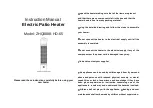
28
AIR SHUTTER ADJUSTMENT
If the installation is at a high elevation and the burner
flame exhibits flame lifting and/or noise, do the following:
1.
Use a screw driver to loosen the air shutter screw.
2.
Adjust the air shutter by rotating the shutter. Counter
clockwise to close and Clockwise to open.
a.
Close air shutter - to prevent noisy flames that are
lifting from the burner ports.
b.
Open air shutter – to reduce yellow tipping of the
flame. (A small number of yellow tips can be normal
to LP gases.)
3.
Tighten the air shutter screw to secure the air shutter.
See
Adjusting Air Shutter for Higher Altitudes
.
HOUSEKEEPING
Fire and Explosion Hazard
Do not obstruct combustion air
openings at the bottom of the
water heater.
Do not use or store flammable vapor
products such as gasoline, solvents
or adhesives in the same room or area
near water heater or other appliance.
Can cause serious injury or death.
Vacuum around base of water heater for dust, dirt, and
lint on a regular basis.
INSTALLED IN SUITABLE AREA: To insure sufficient
ventilation and combustion air supply, proper clearances
from the water heater must be maintained. See
materials such as clothing, cleaning materials, or
flammable liquids, etc. must not be placed against or
adjacent to the water heater which can cause a fire.
ANODE ROD INSPECTION
Property Damage Hazard
•
Avoid water heater damage.
•
Inspection and replacement of anode rod required.
CAUTION
The anode rod is used to protect the tank from corrosion.
Most hot water tanks are equipped with an anode rod.
The submerged rod sacrifices itself to protect the tank.
Instead of corroding the tank, water ions attack and eat
away the anode rod. This does not affect water’s taste
or color. The rod must be maintained to keep the tank in
operating condition.
Anode deterioration depends on water conductivity, not
necessarily water condition. A corroded or pitted anode
rod indicates high water conductivity and should be
checked and/or replaced more often than an anode rod
that appears to be intact. Replacement of a depleted
anode rod can extend the life of your water heater.
Inspection should be conducted by a qualified service
agency, and at a minimum should be checked annually
after the warranty period.
Artificially softened water is exceedingly corrosive
because the process substitutes sodium ions for
magnesium and calcium ions.
The use of a water softener may decrease the life of the
water heater tank.
The anode rod should be inspected after a maximum of
three years and annually thereafter until the condition of
the anode rod dictates its replacement.
NOTE: Artificially softened water requires the anode rod
to be inspected annually.
TEMPERATURE-PRESSURE RELIEF VALVE TEST
Burn hazard.
Hot water discharge.
Keep clear of Temperature-
Pressure Relief Valve
discharge outlet.
It is recommended that the temperature-pressure relief
valve should be checked to ensure that it is in operating
condition every 6 months.
When checking the temperature-pressure relief valve
Содержание BT-100-LP
Страница 45: ...45 NOTES ...
Страница 47: ...47 ...
















































